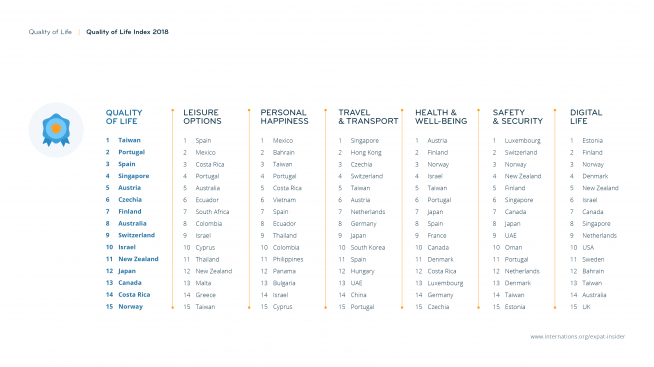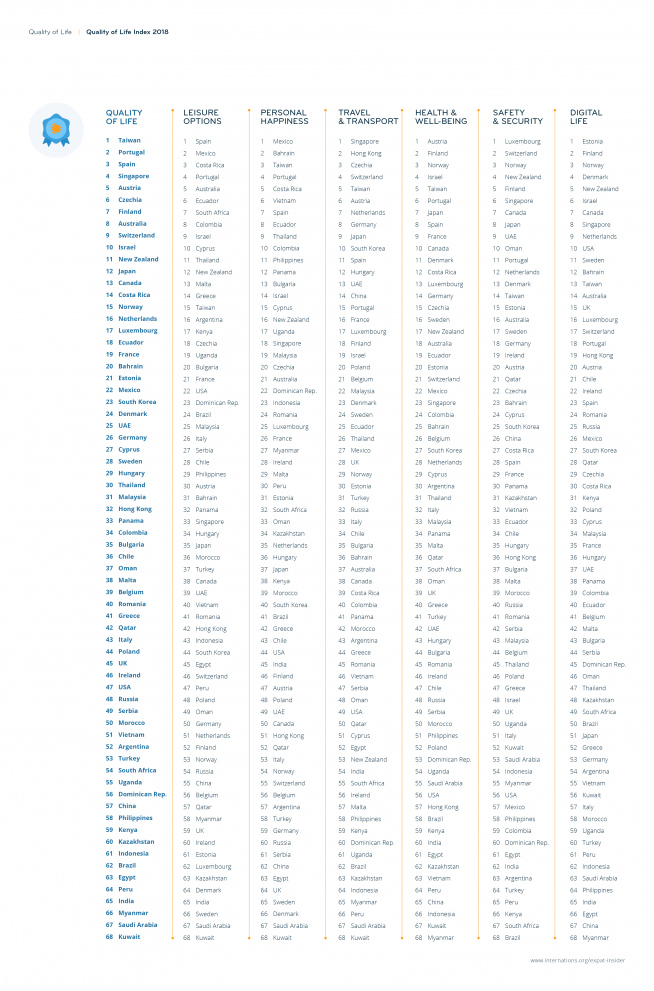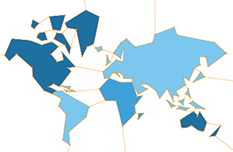Where Expats Enjoy Life Abroad
- Malta drops 19 ranks as expats struggle with the political situation.
- Germany is falling behind regarding digitalization, losing 16 places.
- Israel, Australia, and Bahrain are the clear winners in the index.
- Expats in Israel have been feeling increasingly safe.
- Australia impresses with relatively affordable and high-quality healthcare.
- Bahrain has improved particularly for peacefulness and personal safety.
Methodology
The Quality of Life Index features 68 countries with a sample size of at least 75 respondents. The index itself covers six different subcategories: Leisure Options, Health & Well-Being, Safety & Security, Personal Happiness, Travel & Transportation, and Digital Life. The latter was newly introduced in 2018.
Business as Usual in the Top and Bottom 3
In comparison to the 2017 results for the Quality of Life Index, not much has changed in the top 3. Taiwan, the 2016 winner, is back in first place, followed by the 2017 number one Portugal, and Spain.
Taiwan is particularly popular for its affordable healthcare (96%) and the quality of medical care (92%), as well as personal safety (98%). The “affordable, multi-faceted healthcare system” impresses expats from the US as much as those from other countries. In the past 25 years, Taiwan has made the change to a single-payer system which provides comprehensive care.
I love how peaceful, safe, and family-centered Portugal is.
Expats in Portugal, on the other hand, are especially impressed with the quality of the environment (96%) and the local climate and weather (94%). Another area in which Portugal is doing rather well is the Safety & Security subcategory. All in all, 77% of expats are completely satisfied with the country’s peacefulness, and 73% consider their personal safety to be outstanding. An expat from the US agrees that the country is indeed “peaceful, safe, and family-centered”, and a Brazilian survey respondent says that she came to Portugal in search of security.
While Spain also receives a lot of positive feedback for peacefulness and personal safety (90% and 93%, respectively), only 55% rate the political situation positively. This might have to do with the 2017 protests and the push for independence in Catalonia. Since the Spanish government temporarily suspended the region’s autonomy, the relationship between Catalonia and Spain has been tense.
On the upside, Spain shows great results for all factors in the Leisure Options subcategory. The country receives the best ratings for available leisure options in general (93% positive ratings), and 96% of expats in Spain enjoy the local climate and weather.
In the bottom 3, Kuwait, Saudi Arabia, and Myanmar occupy 68th, 67th, and 66th place. All three have consistently been ranked among the bottom 10 in the past five years.
Malta: Not As Peaceful As It Seems
Malta is the biggest loser in the Quality of Life Index, dropping 19 ranks from 19th to 38th place. While the little island still receives favorable results for its climate and weather (96%), it does not impress with regard to socializing and leisure. Only 69% of expats rate this factor favorably, compared to 76% in 2017, and 17% are unhappy with the available leisure activities in general.
Corruption seems endemic at all levels of society in Malta.
Moreover, many expats seem to feel increasingly affected by the political situation. Only five in nine expats in Malta (56%) give the country’s political stability a positive rating, compared to a global average of 63%. One expat from the UK says that “corruption seems endemic at all levels of society”, and an Irish survey respondent even thinks that “the horrendous corruption in every aspect of governance is appalling”. Slightly over one in six expats (18%) are also unhappy with the lack of peacefulness in Malta.
Despite these less than favorable results, the destination still receives positive feedback for personal safety — 87% of respondents are generally happy with this factor.
Germany: An Unimpressive Digital Life
In 2018, Germany has lost 16 places in the Quality of Life Index, dropping from 10th to 26th rank, not least due to the country’s poor performance in the new Digital Life subcategory. Expats find it challenging to get a local mobile phone number, with one in nine (11%) giving this factor a negative rating. Paying without cash seems to be even more of an issue — 35% find this generally difficult to do in Germany. A Moldovan survey respondent also laments the “underdeveloped online services provided by authorities and the primitive internet network”. This highlights the fact that Germany is not keeping pace with many other countries when it comes to digitalization — the country only ranks 17th in the Digital Competitiveness Ranking of the IMD Business School in Lausanne.
I don’t like the underdeveloped online services provided by authorities and the primitive internet network in Germany.
Germany has indeed lost ground across almost all factors, compared to 2017. However, expats seem to be particularly dissatisfied with socializing and leisure activities in general. Almost a quarter (23%) rate them negatively, causing the country to lose 21 ranks for this factor. While the available leisure activities get somewhat better feedback, with 79% positive responses, the country is still doing worse than in 2017 and drops from 16th to 23rd place for this aspect of life abroad.
A total of 14% also say that they are generally unhappy with their life in Germany. Most of them answered the optional questions about factors that may influence this result: half (50%) struggle with the language barrier, 49% miss their personal support network, and 62% don’t think that there are enough socializing opportunities in the country. (Multiple answers to this question were possible.)
Argentina, Turkey, Sweden: Falling Behind in the Quality of Life Index
The place of the third-biggest loser in the Quality of Life Index is shared by Argentina, Turkey, and Sweden — all three countries have dropped 14 places between 2017 and 2018, and Sweden is even the biggest loser in the overall ranking. Both Argentina and Turkey perform rather badly in the Safety & Security subcategory — a fact that hasn’t changed much since 2016. Both countries have been consistently in the bottom 10 since then.
When it comes to the opportunity to travel, Argentina’s approval ratings have dropped by five percentage points. Only 67% are satisfied with this factor in 2018, compared to slightly over five in seven (72%) in 2017.
Turkey has also lost some of its appeal when it comes to travel and transportation. The country has dropped ten places in this subcategory, from ranking 21st in 2017 to 31st in 2018. Many expats struggle specifically with the traffic in bigger cities — one British expat living in Istanbul says, “traffic is terrible and wastes too much time.” One in six expats in Turkey (17%) is unhappy with the available leisure activities.
Traffic in Turkey is terrible and wastes too much time.
The third country in the group, Sweden, receives rather positive ratings in the Digital Life subcategory. Expats find it particularly easy to pay without cash in this Scandinavian country; so easy, in fact, that Sweden receives no negative ratings for this factor. However, what the country wins in digital accessibility, it loses in regard to various other factors, including the available leisure activities, where it drops 22 places. All in all, 19% of expats are unhappy with this factor.
Where Expat Life Has Improved a Lot
Israel, the clear winner in the 2018 Quality of Life Index, has gained 21 ranks, making it to 10th place in 2018. Expats seem to be particularly content there — 28% even say that they are very happy with their life in general. The country also occupies 11th place (out of 117 countries ranked) in the United Nations’ World Happiness Report.
Israel has improved when it comes to personal safety and political stability, gaining ten places for both factors. One British expat in Israel appreciates that “in spite of the threat of terrorism, day-to-day life is very safe, and so I have the freedom to travel around, knowing that people look out for each other.”
The second big winner in this index, Australia, has climbed a few places for the affordability and quality of healthcare. A solid 64% and an impressive 81% rate these factors favorably. Australia’s healthcare system Medicare is a universal, national, tax-financed insurance scheme which covers the majority of doctor visits as well as public hospital treatments. Medication is heavily subsidized by the national Pharmaceutical Benefits Scheme, keeping the costs low.
What’s more, 94% judge the quality of the environment positively. “I love the pure water and the clean air,” one US American expat says. “I can breathe fully, and I can see for miles and miles.” It is not a surprise then that Australia also places eighth in the Quality of Life Index.
Bahrain, the third winner of the group, only comes in 20th for quality of life, but it has still gained an impressive twelve places. The country has improved particularly when it comes to personal safety, allowing it to gain ten places. Expats in Bahrain are also impressed with the peacefulness in the country — 88% give this factor a positive rating, compared to 78% globally.
Full Ranking
Further Reading
- The New York Times. The Leap to Single-Payer: What Taiwan Can Teach. 26 Dec 2017.
- Public Seminar. The Current Situation in Catalonia. 4 Mar 2018.
- Deutsche Welle, Made for Minds. Germany in the Digital Slow Lane. 9 Jun 2017.
- World Happiness Report 2018.
- The Conversation. Australia’s health system is enviable, but there’s room for improvement. 21 Sep 2017.
- Expat Insider 2018 — Sun in One Asian Tiger State, Rain in Another
- Expat Insider 2018 — Portugal: A Family Paradise with an Excellent Quality of Life
- Expat Insider 2018 — Sun, Sea, Sand, and the Good Life in Spain
- Expat Insider 2018 — Isolated by Language but Economically Secure in Germany
- Expat Insider 2018 — The Biggest Winners & Losers
- Expat Insider 2017 — A Place in the Sun? Where Expats Enjoy the Quality of Life
- Expats in Taiwan
- Expats in Spain
- Expats in Portugal





